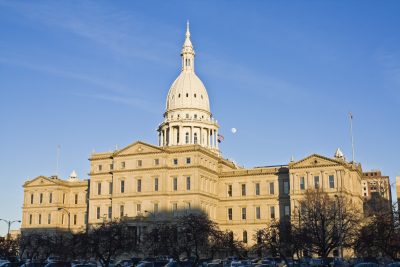Global Competitiveness
The United States has long been the destination for the world’s most talented immigrants. Despite the last 50 years of technological advancement, American immigration policy has remained virtually unchanged, putting in danger America's global competitiveness. Yesterday's immigration policy no longer meets today’s economic needs. Only about 14 percent of all U.S. green cards are given for economic reasons, compared to more than 60 percent in Canada and Australia. With no dedicated visa for entrepreneurs and numerous barriers to residency in place for international students to stay after graduation, America's outdated immigration policy could allow other countries to out-compete us by attracting and keeping the best and brightest there and not here.

New American Economy Statement on Trump Administration’s Suspension of Green Cards
In response to President Trump’s decision to suspend much of U.S. immigration for 60 days, New American Economy issued the following statement: “The President is rightly eager to get the economy moving again, but a 60-day suspension of green cards will only slow down that process and hurt American businesses… Read More

GROW NKY Releases Regional Immigrant Integration Plan
First-ever plan in Northern Kentucky has recommendations for better integrating immigrants into the local community, economy, and workforce Covington, KY – GROW NKY, the strategic workforce collective working to leverage Northern Kentucky’s assets to grow, attract and retain a globally competitive workforce, released a regional immigrant integration community plan today. Read More

As Georgia Considers Expanding In-State Tuition, New Research Shows Legislation for Dreamers Could Lead to $3.4 million in Additional Tax Revenue for Georgia
New data shows significant economic benefits for the state, including $27.6 Million More in Immigrants’ Spending Power Every Year Atlanta, Georgia – Today New American Economy (NAE), a bipartisan immigration research and advocacy organization, released a new study showing how extending in-state tuition to all residents, regardless of immigration… Read More

Michigan Business and Industry Leaders Launch Michigan Compact on Immigration and Call for Reform
New research from New American Economy finds that immigrants contribute $2.1 billion in state and local taxes and hold $18.4 billion in spending power Lansing, Michigan — Today, a coalition of business and industry leaders came together at the Lansing Regional Chamber of Commerce to launch the Michigan Compact… Read More

New Research Shows Banning In-State Tuition for Dreamers Could Cause Missouri to Miss Out on Millions in Additional Tax Revenue and Spending Power Every Year
As the Missouri Legislature considers prohibiting access to in-state tuition for Missouri Dreamers, new data shows there are significant economic benefits the state would bypass. Jefferson City, MO – Today New American Economy (NAE), a bipartisan immigration research and advocacy organization, released a new study showing how offering in-state… Read More

From coding to coaching — an immigrant entrepreneur makes it his mission to help the next generation succeed
Rashaad Bajwa arrived in the United States when he was 3 years old. Learning English was easy, given his age. And his parents, educated in British schools in Pakistan, spoke English at home. But he still lived the immigrant experience. “I still am,” he says. “Even though I grew up… Read More

New Data Shows Immigrants Make Up More Than 60 Percent of Middlesex County’s STEM Workers and Nearly Half of Business Owners
Immigrants held $9.4 billion in spending power– 42.8 percent of the total spending power in the county–and contributed more than $4 billion in taxes in 2018. Middlesex, NJ — Despite making up 34.5 percent of Middlesex County’s population, immigrants accounted for 64.4 percent of the county’s Science, Technology, Engineering,… Read More

New American Economy on the RELIEF Act of 2019
New American Economy explains the merits of the RELIEF Act of 2019. Read More

New Data Shows Toledo and Lucas County Immigrants are Offsetting Local Population Loss
Toledo, OH – Immigrant community members who live in the City of Toledo and Lucas County have partially offset local population loss, according to new research by New American Economy (NAE). The report, which was published in partnership with Welcome Toledo-Lucas County (TLC), a local cross-sector initiative housed… Read More

New American Economy Announces First-of-its-Kind New American Festival, a Celebration of Immigrants in American Culture, September 14-15, 2019
NEW YORK – New American Economy (NAE) announces the launch of the New American Festival, a groundbreaking celebration of immigrant contributions to American comedy, art, food, film, fashion, and more. This festival highlights how so much of American culture is shaped by immigrants, and how diversity has electrified creativity… Read More
Impending Labor Challenges
The United States is facing demographic challenges that endanger its preeminent economic position in the world. An aging workforce threatens the vitality of the labor force. At the same time, the supply of U.S.-trained engineers is lagging behind nearly all other industrialized economies. At a time when tech-heavy and innovation driven industries are driving economic growth, the United States faces the prospect of being left behind.
Table 1: Share of Population Age 65+, 1996, 2006, 2016 and projected 2030
Table 2: Share of Undergrads Studying Engineering
Prioritizing Economic Needs
Many countries have identified the link between immigration and economic growth. For many, such moves are a matter of necessity–the domestic labor force is not sufficient for an expanding economy, and aging populations and declining fertility rates are creating labor shortages. Despite facing some of the same challenges, U.S. immigration policy has not changed to reflect our economy’s evolving needs.
Table 3: Percentage of All Permanent Residency Visas Given for Economic Reasons*
Need for a Start-Up Visa
Countries around the world, from France, to Chile, to Singapore have created visas aimed at attracting promising entrepreneurs and job creators. Despite concerns about meager job creation and business growth, however, the United States has not taken a similar step, endangering our position in the global race for talent. This situation was made worse in 2017 when the administration took the first steps to kill the International Entrepreneur Rule, a measure that would have allowed entrepreneurs with outside funding to remain in the country for 2.5 years to establish their businesses.
Make a contribution
Make a direct impact on the lives of immigrants.
